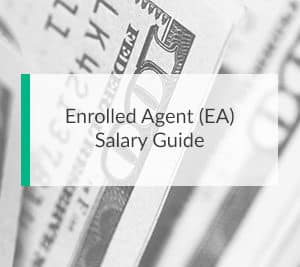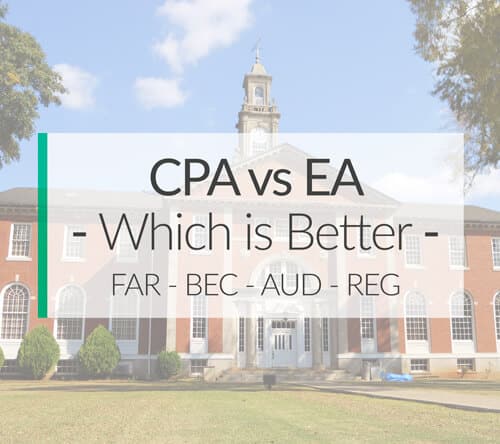
If you are considering making a career change or simply exploring career options in the accounting industry, one career choice you may be thinking about is becoming an Enrolled Agent (EA).
Congress created the designation of enrolled agent in 1884 following the Civil War. At this time, numerous U.S. citizens had government claims regarding property confiscated during the war. With the new designation, enrolled agents were given the ability to represent citizens and prepare claims. After Congress passed the income law in 1913, the duties of EAs were expanded to include tax representation.
The ideal candidate to be an enrolled agent is someone who is detail oriented and enjoys delving into the continually changing nature of tax laws. Individuals who are considering becoming enrolled agents should enjoy working with people and have high ethical standards.
The National Association of Enrolled Agents reports that there are more than 50,000 enrolled agents working in the United States as well as abroad. Before delving too deeply into this field as a career option, it’s important to understand EA salaries to determine if this is the right career choice for you.
Here’s the deal:
What Is An Enrolled Agent?
An enrolled agent is responsible for representing individuals to the Internal Revenue Service. Since an enrolled agent has a number of responsibilities, the salary tends to be fairly lucrative.
The Internal Revenue Service, in an effort to satisfy legal requirements, confers the status of enrolled agent to qualified candidates. An individual who has been certified as an enrolled agent is then allowed to serve as an intermediary for private businesses and citizens in relation to tax questions and disputes. Enrolled agents are typically employed by businesses specializing in handling income tax resolutions or preparing tax returns.
An enrolled agent usually works on a year-round basis helping clients. As part of an EA’s job responsibilities, he or she often develops a strategy for handling matters with the IRS. In this capacity, enrolled agents work to reach satisfactory agreements regarding plans, payments, estimations, and settlements. Due to the fact that this type of work can be quite complex, the job of an EA is often in high demand.
The hearings that an EA will often take part in usually occur via telephone. As a result, EAs must possess excellent communication skills. Additionally, enrolled agents must possess a thorough understanding of IRS documentation, as the documentation must be filed with the IRS. For this reason, an enrolled agent must also be well organized and capable of meeting reporting and filing deadlines. In order to work as an enrolled agent, candidates must receive the proper certification from the Internal Revenue Service. Generally speaking, interested candidates should have a background in public accounting. It’s also important to have tax preparation practical experience.
Job Tasks For Enrolled Agents
Enrolled agents should typically be prepared to perform the following job tasks:
- Guide the tax decisions of management by discussing potential tax consequences.
- Recommend the best course of action.
- Make tax payments.
- Prepare tax returns by collecting, formatting, and analyzing financial information.
- Recommend strategies for the purpose of minimizing liability by researching and evaluating various tax options.
You might be wondering:
How Much Do Enrolled Agents Earn?
Enrolled Agent Salaries
EA salaries depend on a variety of factors, such as the number of years of experience, type of experience, and work location. There are three salary levels for enrolled agents. They are entry level, mid-level, and senior level.
Enrolled Agent Salaries for Entry Level
An entry-level enrolled agent with up to five years of experience can typically expect to earn an average of $42,000 per year.
Enrolled Agent Salaries for Mid-Level
A mid-level enrolled agent with between five and 10 years of experience can generally expect to earn an average salary of $50,000.
Enrolled Agent Salaries for Senior Level
A senior-level enrolled agent with between 10 and 20 years of experience can typically expect to earn an average salary of $55,000. Agents with more than 20 years of experience may see a pay raise up to $60,000 per year.
CPA vs. EA
Both certified public accountants (CPAs) and enrolled agents (EAs) must adhere to strict ethical standards. Among the differences between these two careers is that certified public accountants are regulated at the state level. By comparison, enrolled agents are regulated at the federal level. In order to become a certified public accountant, candidates are required to complete a minimum of 150 undergraduate hours. Additionally, it’s necessary to pass a four-part examination.
This exam covers auditing and attestation, business environment and concepts, financial accounting and reporting, and regulation. Overall, it usually takes at least eight years to become a certified public accountant due to the necessary requirements. In some states, candidates must also work a certain number of hours under the direction of a CPA prior to being allowed to sit for the exam.
To become an enrolled agent, it is necessary to pass a three-part examination. This exam is comprehensive and covers every aspect of the tax code. Additionally, anyone who is interested in becoming an EA will need to pass a background check. This check is performed by the Internal Revenue Service. The background check will consist of researching the candidate’s personal tax history. This is quite important considering the importance of ethics in this job role. The length of time required to become an enrolled agent is much less than the amount of time required to become a CPA.
Here’s the kicker:
Certified public accountants do generally have more job opportunities due to the fact that they can work for private individuals, in the private sector, or for the government.
Generally speaking, CPA salaries tend to be higher than enrolled agent salaries. This could depend on where the individual is on the career ladder. However, the salary of a CPA will quickly exceed the salary pace of an EA. This is because the income potential for enrolled agents tends to taper out over time. The peak salary for enrolled agents is about $60,000. By comparison, a CPA can have a number of opportunities for earning money. For instance, CPAs working for conglomerates or in a CPA firm could easily bring in six-figure salaries.
Overall, it is easier and faster to become an EA than a CPA. Anyone is allowed to sit for the enrolled agent exam, which is not the case for the CPA exam. In order to sit for the EA exam, all that is required is a preparer tax identification number. Candidates can then register to take the exam. After passing the exam and paying the necessary enrollment fee, candidates will then be required to pass a compliance check to ensure they have paid all their taxes. EA candidates are not allowed to have any outstanding tax liabilities. Candidates who have a sufficient amount of work experience, according to IRS guidelines, may not even be required to take the exam.
Although CPAs may have a greater earning potential, that salary comes with the need to spend longer in school, gain more work experience, and take a much more in-depth exam. Becoming an enrolled agent still offers plenty of benefits.
Learn more about the EA vs. CPA.
Benefits Of Being An Enrolled Agent
Beyond enrolled agent salaries, there are numerous advantages to becoming an enrolled agent. An EA is the only individual who has been the right to practice as granted expressly by the United States government. Certified public accountants hold state licenses. This type of license restricts their ability to practice to only the states where they have been licensed. Enrolled agents hold federal licensure, which gives them a much broader jurisdiction. This means that enrolled agents are able to represent taxpayers in any state in the country. Furthermore, enrolled agents are able to represent citizens abroad in tax matters.
Becoming an enrolled agent can also provide a certain amount of career security. In the last few years, IRS examinations or audits have increased significantly. This means there is a far greater need for EAs today than in the past. Given the current rising number of examinations, more citizens have found themselves in need of representation. To a large degree, the job of enrollment agents is actually recession proof. Income taxes are a part of life and are not going away. Enrolled agents ensure that citizens receive competent representation. If the idea of protecting the rights of others appeals to you, this could be a great career option.
Individuals who are considering a new career path may find that becoming an enrolled agent is the right choice. Offering excellent job security and the opportunity to have jurisdiction throughout the United States, the position of enrolled agent can provide a good salary along with a rewarding career.










